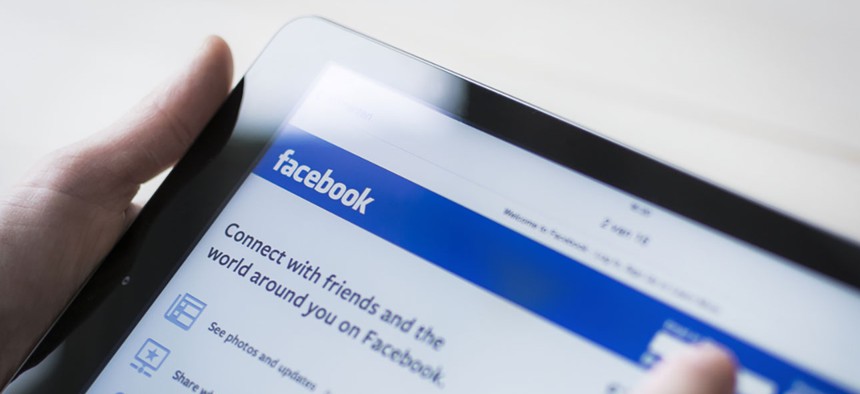
Twin Design / Shutterstock.com
Facebook Just Blocked This Cambridge Analytica Affiliate. Why Does It Still Have a State Department Contract?
Strategic Communications Laboratories worked with Cambridge Analytica, which reportedly used social media data to target likely Trump voters.
In February 2017, the State Department hired a company to help it reach people who might be susceptible to ISIS’s online recruiters. On Friday, Facebook blocked that company — Strategic Communications Laboratories, or SCL — for harvesting and sharing users’ data improperly. But as of press time, SCL still had a contract with State.
SCL used third-party apps to siphon users’ data and send it to Cambridge Analytica, the data-analysis firm that, in the words of The Guardian, “worked with Donald Trump’s election team and the winning Brexit campaign” to harvest “millions of Facebook profiles of US voters” and use them to build “a powerful software program to predict and influence choices at the ballot box.”
State’s “Global Engagement Center does have a contract with the Strategic Communications Laboratories (SCL) Group to provide research and analytical support in connection with our mission to counter terrorist propaganda and disinformation overseas,” a State Department spokesperson said. “SCL, in particular SCL Defence, has done work for other parts of the U.S. government in the past as well and is a major company in the field of research and analytics.”
Defense One reached out to representatives from SCL and Cambridge Analytica. We’ll update this post if they get back to us.
Barack Obama stood up the Global Engagement Center in 2016 to help counter ISIS propaganda online. Among other things, the Center was intended to use data provided by users of social media platforms to craft highly targeted messages, use social networks to fight propaganda, in similar fashion as marketers use Facebook and Twitter to sell goods and services. The Center quickly turned to Facebook, according to Michael Lumpkin, the center’s founding director.
“Using Facebook ads, I can go within Facebook, I can go grab an audience, I can pick Country X, I need age group 13 to 34, I need people who have liked — whether it’s Abu Bakr Al Baghdadi or any other set — I can shoot and hit them directly with messaging,” Lumpkin said at the 2016 Defense One Summit.
A few weeks after Lumpkin stepped down in January 2017, SCL received a contract with the State Department for about $500,000. The website Govtribe lists the current status as “not completed” but specifies that the work was for FY 17. (Some additional context: the Center has been the subject of news reports showing mismanagement and employee turnover.)
SCL’s website claims that they offer “highly targeted” outreach to specific audiences via “channels such as social media; and indirect channels such as third-party endorsements and network affiliations. Every campaign is measured and evaluated: we execute a truly quantifiable approach to engagement, which ensures maximum efficiency of spending.”
Cambridge Analytica is best known as the data firm that helped the Trump campaign target specific U.S. voters to turn out for their candidate in the 2016 presidential race. But the company also had contact with representatives of Russian oil interest Lukoil in 2014 and 2015, the New York Times reported March 17.
SCL’s role was to assure Facebook that Cambridge Analytica was properly handling the data provided by Facebook users, the Guardian reported. “SCL Elections, an affiliate, worked with Facebook over the period to ensure it was satisfied no terms had been ‘knowingly breached’ and provided a signed statement that all data and derivatives had been deleted,” an SLC employee told the paper.
The Guardian also reported that SCL helped Cambridge Analytica link up with a Russian-affiliated researcher named Aleksandr Kogan and his firm Global Science Research. Facebook is accusing Kogan of sharing user data improperly with Cambridge Analytica and SCL.
Facebook’s action suggests that SCL may have benefited from data obtained in violation of Facebook’s terms of service and possibly of U.S. law while serving as a U.S. government contractor. At very least, the suspension means that the company will have a difficult time delivering the products that the company has contracted to provide to the government.







